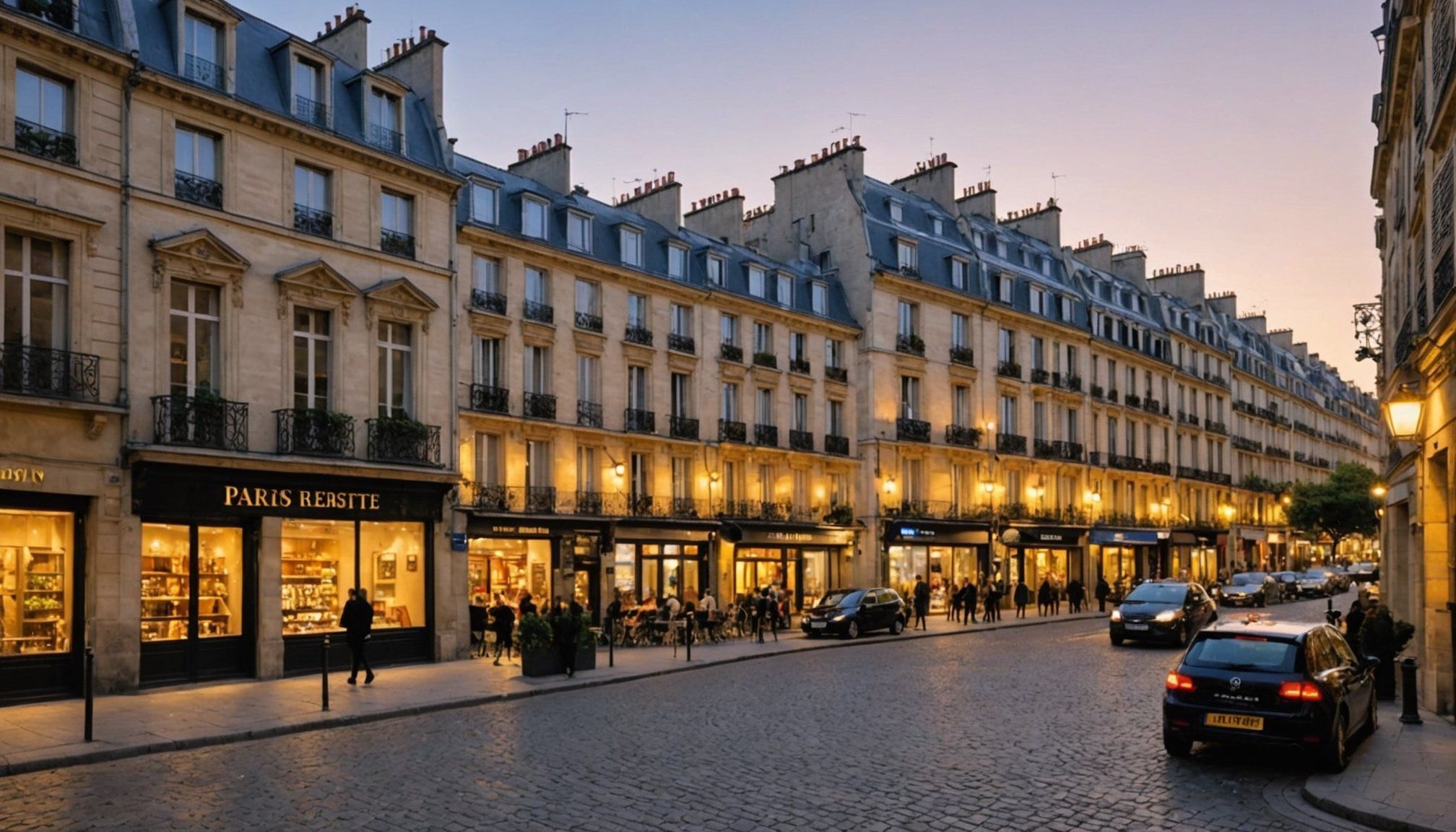Paris real estate holds immense potential, but navigating its complexities can be daunting. Understanding market trends, pricing strategies, and neighborhood dynamics is essential for making informed decisions. This guide provides tailored insights for various buyer profiles, emphasizing financing strategies and legal considerations crucial for a smooth transaction. Discover how to identify your perfect property and unlock the door to an enriching Parisian lifestyle.
Introduction to the Paris Real Estate Market
Unlocking Paris Real Estate Insights provides potential investors with a gateway to one of the most captivating property markets in the world. Paris, renowned for its allure and cultural depth, remains a global hotspot for property buyers attracted by its rich history and architectural marvels. The city’s landscape is a delicate tapestry of classic and modern, drawing individuals eager to partake in its real estate story.
A voir aussi : Transforming Barns into Dream Homes: Navigating the Unique Challenges in the English Countryside
Understanding the Paris Real Estate Market Trends is vital for both seasoned investors and newcomers. The city’s property scene is nuanced, with pricing influenced by factors such as location, architectural heritage, and accessibility to amenities like transport and schools. Owning property in central Paris is often viewed as a sound investment due to the area’s high demand and potential for appreciation, bolstered by Paris being a perennial tourist destination. However, navigating this market requires astute awareness of the latest trends. For example, neighborhoods like Haut Marais have witnessed consistent price growth, emphasizing the need for strategic insights.
For expatriates, the expatriate guide to Paris real estate becomes particularly crucial. Acquiring property as a foreign buyer involves understanding specific legalities and financial considerations distinct from those in one’s home country. France offers a robust legal framework that includes a mandatory due diligence phase, referred to as the “Compromis de Vente,” allowing buyers a period to conduct property inspections and secure financing. Engaging a bilingual real estate professional can help navigate potential language and cultural barriers, ensuring clarity and confidence in transactions.
Cela peut vous intéresser : Exploring the Financial Hazards of Investing in UK Coastal Properties Amid Climate Change Challenges
For those eyeing investment, exploring top-notch agencies like <https://detillyparis.com/> can be a game-changing step. They provide unparalleled market access, including exclusive and off-market deals, and are renowned for their proficiency in managing the intricate processes involved in property acquisitions. By leveraging expert guidance, buyers can unlock the full potential of Parisian properties and make informed decisions that align with their financial aspirations.
Key Considerations for Buying Property in Paris
Steps in the Buying Process
The Paris property buying process may initially seem overwhelming, especially for first-time homebuyers. However, by breaking it down into clear steps, the process becomes much more manageable. Initially, start with an extensive property search, using both online resources and real estate agents to identify potential properties. After selecting a property, you will make an offer. If accepted, the next step involves signing a preliminary contract known as the “Compromis de Vente.” At this stage, a 5% to 10% deposit is typically required.
One critical element of the French property purchase is the due diligence period, which usually lasts up to 10 days. During this time, buyers can perform inspections and secure financial arrangements. The opportunity to withdraw without penalty in case of issues during this phase provides a layer of security. The final step is signing the “Acte de Vente” in the presence of a notary, at which point the property ownership is officially transferred upon full payment.
Importance of Professional Guidance
Navigating the complexity of Paris property laws and market norms necessitates professional guidance. This is particularly significant given the legal intricacies and the cultural nuances that can challenge non-French speakers. Engaging a real estate agent familiar with Parisian market specificities can be invaluable. Agents like those from reputable firms often provide full market access, showing not only publicly listed properties but also exclusive off-market options.
Moreover, bilingual agents ensure clarity in communication, reducing misunderstandings. Their guidance doesn’t stop at the purchase; they often offer post-purchase services such as connecting buyers with reliable partners for financing, legal, and design needs. With a robust support network, buyers can confidently make informed decisions, maximizing their investment potential in this dynamic real estate market.
Common Legal Considerations for Buyers
Understanding the legal landscape is essential when buying property in Paris. One primary consideration is the role of the notary, a legal specialist responsible for ensuring all aspects of property transfer comply with French law. The notary safeguards both buyer and seller interests, confirming the authenticity and completeness of documents.
Tax implications are another crucial factor. France has distinct property and ownership taxes, which can significantly impact the cost of buying and owning property. Buyers should be prepared for these financial responsibilities, including property registration and annual property tax (taxe foncière).
Additionally, Parisian real estate regulations can differ from other regions, especially regarding architectural preservation and renovation restrictions. Buying a historic property often means adhering to stringent rules, maintaining the integrity of the façade and interior details. With these considerations, obtaining professional legal advice ensures compliance and smooth transaction completion.
In conclusion, purchasing property in Paris involves navigating a series of steps that require careful attention to legal details and professional guidance. By understanding the buying process, leveraging professional expertise, and acknowledging legal considerations, buyers can effectively manage their investments and secure valuable assets in one of the world’s most culturally and economically vibrant cities.
Analyzing Paris Property Prices and Investment Opportunities
Current Property Price Trends
In the Parisian real estate market, prices are known for their upward trajectory, with properties consistently appreciating over the years. Recent trends indicate that high demand and limited availability continue to drive prices even higher. For instance, in prestigious areas like the 6th arrondissement, prices can exceed €15,000 per square meter, while more affordable districts like the 19th offer prices around €8,000 per square meter. Such variation across neighborhoods underscores the importance of conducting a comprehensive Paris property prices analysis before making investment decisions.
Top Neighborhoods for Investment
When choosing the best neighborhoods in Paris for investment, it’s crucial to factor in elements like location desirability, potential for appreciation, and rental demand. Areas such as Le Marais, Saint-Germain-des-Prés, and the Latin Quarter are highly sought after due to their historical charm and vibrant cultural scenes, promising both long-term appreciation and robust rental returns. Meanwhile, emerging districts like Belleville and Montmartre offer unique opportunities for investors seeking lower entry prices with significant upside potential. The appeal of these neighborhoods lies not only in their economic prospects but also in their distinct cultural and social dynamics.
Understanding ROI in Parisian Real Estate
Real estate investment returns in Paris are generally strong, bolstered by the city’s perpetual allure as a global cultural and economic hub. However, calculating the return on investment (ROI) requires careful consideration of several factors. Key components include purchase price, anticipated appreciation, rental yield, and operational costs. Typically, prime locations yield lower percentages due to higher purchase prices but offer greater stability and appreciation over time. Conversely, up-and-coming neighborhoods might offer higher yields, but with increased risks linked to market fluctuations. Moreover, understanding local property laws and taxes is vital, as these can significantly impact net returns.
Paris presents a compelling case for real estate investment, with each neighborhood offering distinct advantages. Investors must weigh historical appreciation trends against current market dynamics, ensuring that choices align with financial goals and risk tolerance. By leveraging local insights and perhaps employing AI-driven property analytics, investors can better navigate these complexities and seize the best opportunities within the dynamic Parisian market.
Final Thoughts for Potential Buyers
Effective Property Viewing Strategies
When looking at properties in Paris, preparation is your strongest ally. Consider beginning your search by researching neighborhoods extensively. Understanding the uniqueness of each arrondissement can guide you in aligning your property goals with neighborhood characteristics, such as access to cultural venues, parks, and transport links. A strategic approach could include making a prioritized list of must-haves versus nice-to-haves, which will help streamline viewings.
Engage a real estate agent like DE TILLY PARIS, known for their comprehensive market access, to gain insights into both available listings and off-market opportunities. Leveraging the expertise of agents familiar with Parisian real estate dynamics can provide crucial advantages. Remember, observing properties during different times of the day or week allows you to assess variables like natural light and local noise levels.
Factors Influencing Long-Term Value
To comprehend property appreciation in Paris, it’s vital to focus on specific influencing factors. Areas rich in history or artistic appeal, like the Haut Marais, tend to sustain higher value growth. Additionally, factors such as proximity to essential amenities, quality schools, and public transport significantly affect long-term value. Consider investing in areas with planned infrastructural developments or cultural enhancements, as these can lead to increased demand and appreciation.
Analyzing market trends through tools like the Real Estate Value Data Explorer can offer in-depth insights. However, use this tool selectively, given its historical sales data might not reflect current market conditions. Applying such data to understand the trajectory of property values can enhance decision-making for long-term investment.
Avoiding Common Buying Mistakes
Many potential buyers face pitfalls due to insufficient knowledge of the Paris real estate market. A common mistake is underestimating the complexity of the purchasing process. Familiarize yourself with the intricacies of Parisian property laws and the roles of key figures such as notaries. Knowing these elements can streamline your buying journey.
Beware of rushing into transactions without thorough inspections or due diligence. Ensuring comprehensive evaluations of the property’s structure and legal status can prevent future legal and maintenance issues. Moreover, involve bilingual professionals who specialize in navigating the nuances of the local market, allowing you to confidently bypass potential barriers such as language difficulties and bureaucratic hurdles.
Understanding these fundamental strategies and considerations could significantly optimize your property buying experience in Paris, paving the way for both financial success and personal satisfaction.


